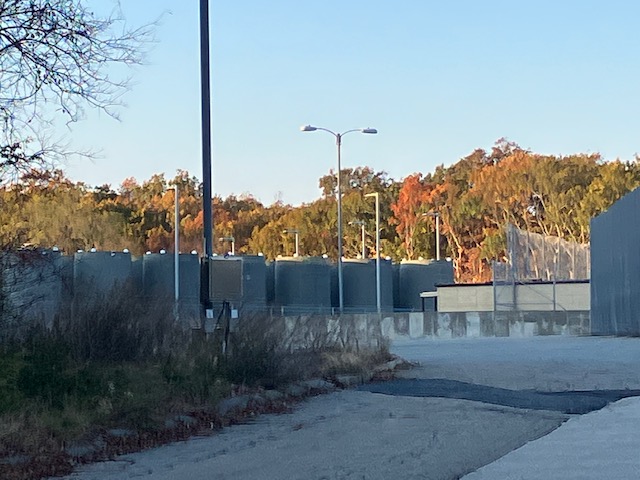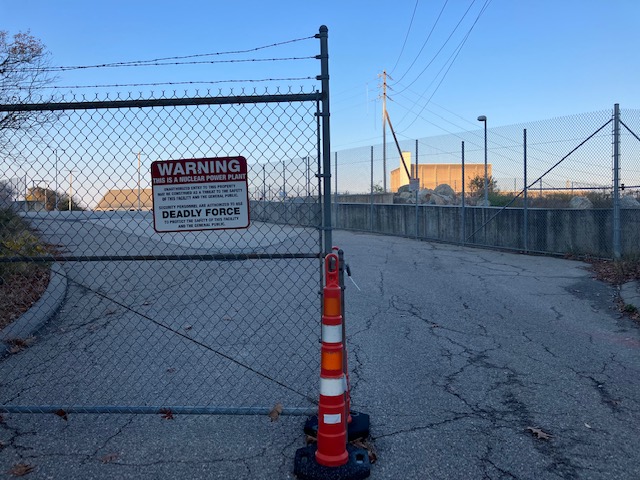WHY ARE THE GATES OPEN?
WHO'S ASKING? WHY ISN'T HOLTEC PROTECTING THIS SITE?
Nearly 200,000 Gallons of Pilgrim Nuclear Waste Vaporized
DEP is waiting to see ‘if they choose to evaporate the water in an active way’
BY CHRISTINE LEGERE NOV 29, 2023
PLYMOUTH — While the debate over the proposed discharge of 1.1 million gallons of radioactive wastewater from the Pilgrim nuclear plant into Cape Cod Bay goes on, Holtec Decommissioning International, the company that now owns the Plymouth reactor, has quietly evaporated nearly 200,000 gallons of it.
The contaminated steam is being released through unfiltered vents in the reactor building.
Andrew Gottlieb, executive director of the Association to Preserve Cape Cod and a member of the advisory panel on Pilgrim’s decommissioning, has accused plant officials of using evaporation to rid themselves of their wastewater problem. Based on how much has been released into the atmosphere as gas over the last several months, he said, the wastewater, and Holtec’s dilemma over how to get rid of it, could be gone before a decision is reached on its disposal.
So far, Holtec is saying the evaporation is not actually the company’s chosen method of ridding the shuttered plant of radioactive waste. Instead, the company says, the evaporation is incidental to other activities.
The company installed submersible heaters in the wastewater-filled reactor cavity in February, saying they would speed the drying time for boxes containing irradiated pieces of the reactor that had been removed from the cavity. They also said the heaters in the pools raised the temperature in the reactor building so workers there would be more comfortable.
The heaters were shut down during the summer but went back online on Nov. 22.
At the Nov. 27 meeting of the Nuclear Decommissioning Citizens Advisory Panel (NDCAP) in Plymouth, David Noyes, Holtec’s compliance manager at Pilgrim, presented a revised schedule for the plant’s decommissioning.
The 2022 timetable had set the completion date for decommissioning and partial release of the site at September 2027. Several months ago, that date was extended by four years to September 2031. At the time, Noyes told the panel that Holtec was going to pause the work to allow time for more interest to accumulate in the decommissioning trust fund for the plant.
On Nov. 27, Noyes presented a new schedule pushing the completion date out another four years to September 2035.
Holtec blamed the delay on the debate over the disposal of the plant’s contaminated wastewater. In July, the state Dept. of Environmental Protection (DEP) issued a preliminary denial of a permit Holtec needs if it is to discharge the water into Cape Cod Bay. The Environmental Protection Agency has made no decision yet on Holtec’s request for a required amendment to its federal water discharge permit.
Local and regional officials, members of the fishing and tourist industries, and the public have opposed the discharge of the wastewater into the bay, which is Holtec’s preferred disposal method.
At the meeting, Gottlieb asked whether Holtec would appeal the denial of the discharge permits, and Noyes confirmed that the company planned to take it to court.
“You’re going to drag this out for a variety of reasons, such that you either prevail in court and discharge into the ocean, or it evaporates out, and it’s gone, and your problem is solved,” Gottlieb said, describing the situation as “heads I win, tails you lose.
“It’s fundamentally clear to me you’re playing out the clock,” Gottlieb said.
He wasn’t alone in his concern. Seth Pickering, who represents the DEP on the advisory panel, said his agency had notified Holtec in late September that it would need to apply for an air quality permit if it chose evaporation as its primary option for getting rid of the wastewater.
Kevin Canty, a member of both the Plymouth Select Board and NDCAP, asked what would happen if Holtec just kept letting the water evaporate through the vents. “What if there’s passive evaporation and over the eight-year period they never notify you it’s their primary plan?” Canty asked. “Can the state act prior to them formally notifying you?”
Pickering responded that DEP is waiting to see “if they choose to evaporate the water in an active way.
“The amount of tritium in that water won’t add up to a ton, even if they evaporate it all in one year,” Pickering said. Tritium, a radionuclide, cannot be filtered out of the contaminated water.
Gottlieb brought up what he called “the alphabet soup” of other pollutants that were found in the wastewater when it was recently tested.
Pickering said that the notification of another four-year delay in decommissioning will prompt DEP “to look at everything.”
Gottlieb asked whether Holtec was making forward-going calculations about the ongoing evaporation. “Why can’t you predict how much volume will be evaporated in eight years?” he asked Noyes. “You’re a nuclear operator.”
James Lampert, who was elected NDCAP chair at the Nov. 27 meeting, asked Noyes to come to the panel’s January meeting with some projections on the amount of evaporation that would take place over eight years.
Time should also be set aside at a future meeting to review the options for disposal of the wastewater, Lampert said. On the table are discharge into the bay, evaporation, onsite storage, or shipping it offsite.
Mary Lampert, who is James’s wife and also a member of NDCAP, said that Holtec had calculated that the cost of trucking the wastewater offsite to a disposal facility, the method preferred by the public and most officials, would be about $20 million. Delaying decommissioning and appealing denied permits in court will probably cost Holtec more than that, she said.
Jack Priest, director of the radiation control program for the state Dept. of Public Health and a member of NDCAP, was concerned about the effect of a delay and possible court appeal on the decommissioning trust fund.




